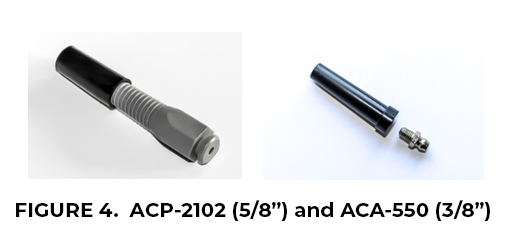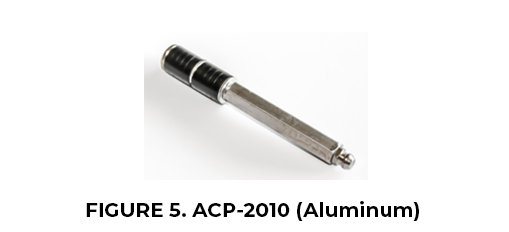
Mechanical Packers come in many types. In the concrete repair industry, contractors will find plastic, steel, brass, aluminum, zinc, and other metal alloys. The most commonly used type is steel. Steel offers the benefits of strength and resistance to oxidation through chemical grout oxidizing components found in grouts such as acrylics. Brass and Aluminum packers are weaker and allow for the shaft to be broken off by hammer for more timely patching efforts following injection. However, most Quality Control Managers and clients will require the removal of all metal from the substrate prior to patching. The chosen method of removal is the choice of the client and/or design professionals.
There are two types of plastic packers used (see FIGURE 4). The 5/8” (16mm) button top packer is used for high volume applications and for applications in which a button-top coupler is preferred to minimize leakage. The free-floating ball in the middle of the packer acts as an anti-return valve. A 5/8” (16mm) plastic sleeve is inserted first, with the threaded plastic base then screwed into compression via the hex head top. Another common port used is the 3/8” (10mm) plastic bang-in, or hammer-in port. These ports are simply inserted into a 3/8”(10mm) drill hole aided by the force of a hammer. The soft nature of the plastic allows the concrete to bite into the sides of the packer creating a compression seal. Because plastic packer compression is achieved through plastic to concrete friction, the overall pressure tolerances are typically lower than that of the mechanical packer counterpart.

Aluminum packers have recently become more prevalent in the industry due to the combination of economical pricing with the benefits of mechanical packer pressure tolerances (see FIGURE 5). Due to the softness of the components, however, these packers have been known to strip threads at times. All functionality considered, aluminum packers do offer a reasonably price alternative to the steel mechanical packers.

Alchemy-Spetec continues to offer a popular heavy-duty ½” (13mm) and 5/8” (16mm) packer with a soft grade of rubber and washer on the top of the packer that adds extra friction and bite to the concrete when tightened. The heavy-duty packer offering is in steel (see FIGURE 6). These heavy-duty packers are top-mounted ball-valve style and can be converted to button-top valve (see next section and below).

Want more information on mechanical packers?


